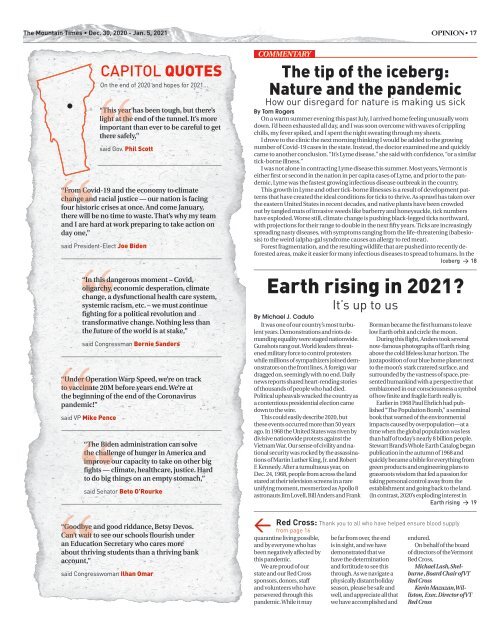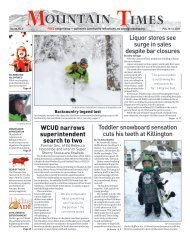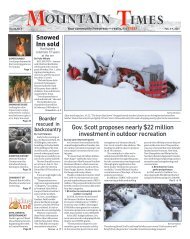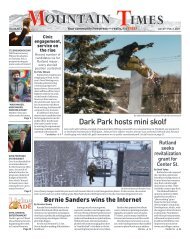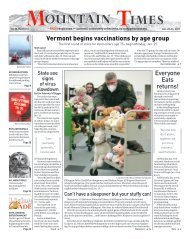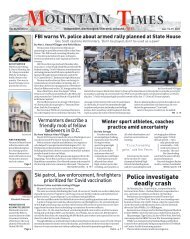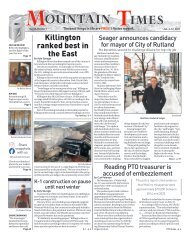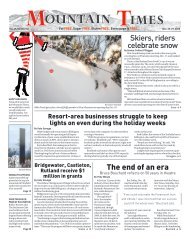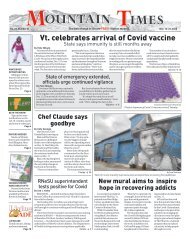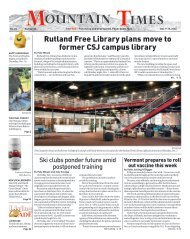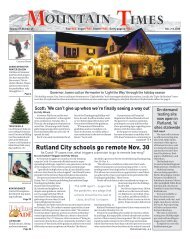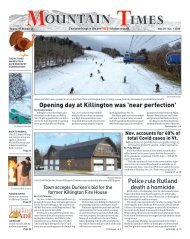Mountain Times - Vol. 49, No. 53 - Dec. 30, 2020 - Jan 2, 2021
Create successful ePaper yourself
Turn your PDF publications into a flip-book with our unique Google optimized e-Paper software.
The <strong>Mountain</strong> <strong>Times</strong> • <strong>Dec</strong>. <strong>30</strong>, <strong>2020</strong> - <strong>Jan</strong>. 5, <strong>2021</strong> OPINION• 17<br />
CAPITOL QUOTES<br />
On the end of <strong>2020</strong> and hopes for <strong>2021</strong>...<br />
“This year has been tough, but there’s<br />
light at the end of the tunnel. It’s more<br />
important than ever to be careful to get<br />
there safely,”<br />
said Gov. Phil Scott<br />
“From Covid-19 and the economy to climate<br />
change and racial justice — our nation is facing<br />
four historic crises at once. And come <strong>Jan</strong>uary,<br />
there will be no time to waste. That’s why my team<br />
and I are hard at work preparing to take action on<br />
day one,”<br />
said President-Elect Joe Biden<br />
“In this dangerous moment – Covid,<br />
oligarchy, economic desperation, climate<br />
change, a dysfunctional health care system,<br />
systemic racism, etc. – we must continue<br />
fighting for a political revolution and<br />
transformative change. <strong>No</strong>thing less than<br />
the future of the world is at stake,”<br />
said Congressman Bernie Sanders<br />
“Under Operation Warp Speed, we’re on track<br />
to vaccinate 20M before years end. We’re at<br />
the beginning of the end of the Coronavirus<br />
pandemic!”<br />
said VP Mike Pence<br />
“The Biden administration can solve<br />
the challenge of hunger in America and<br />
improve our capacity to take on other big<br />
fights — climate, healthcare, justice. Hard<br />
to do big things on an empty stomach,”<br />
said Senator Beto O’Rourke<br />
“Goodbye and good riddance, Betsy Devos.<br />
Can’t wait to see our schools flourish under<br />
an Education Secretary who cares more<br />
about thriving students than a thriving bank<br />
account,”<br />
said Congresswoman Ilhan Omar<br />
COMMENTARY<br />
The tip of the iceberg:<br />
Nature and the pandemic<br />
How our disregard for nature is making us sick<br />
By Tom Rogers<br />
On a warm summer evening this past July, I arrived home feeling unusually worn<br />
down. I’d been exhausted all day, and I was soon overcome with waves of crippling<br />
chills, my fever spiked, and I spent the night sweating through my sheets.<br />
I drove to the clinic the next morning thinking I would be added to the growing<br />
number of Covid-19 cases in the state. Instead, the doctor examined me and quickly<br />
came to another conclusion. “It’s Lyme disease,” she said with confidence, “or a similar<br />
tick-borne illness.”<br />
I was not alone in contracting Lyme disease this summer. Most years, Vermont is<br />
either first or second in the nation in per capita cases of Lyme, and prior to the pandemic,<br />
Lyme was the fastest growing infectious disease outbreak in the country.<br />
This growth in Lyme and other tick-borne illnesses is a result of development patterns<br />
that have created the ideal conditions for ticks to thrive. As sprawl has taken over<br />
the eastern United States in recent decades, and native plants have been crowded<br />
out by tangled mats of invasive weeds like barberry and honeysuckle, tick numbers<br />
have exploded. Worse still, climate change is pushing black-legged ticks northward,<br />
with projections for their range to double in the next fifty years. Ticks are increasingly<br />
spreading nasty diseases, with symptoms ranging from the life-threatening (babesiosis)<br />
to the weird (alpha-gal syndrome causes an allergy to red meat).<br />
Forest fragmentation, and the resulting wildlife that are pushed into recently deforested<br />
areas, make it easier for many infectious diseases to spread to humans. In the<br />
Iceberg > 18<br />
Earth rising in <strong>2021</strong>?<br />
It’s up to us<br />
By Michael J. Caduto<br />
It was one of our country’s most turbulent<br />
years. Demonstrations and riots demanding<br />
equality were staged nationwide.<br />
Gunshots rang out. World leaders threatened<br />
military force to control protesters<br />
while millions of sympathizers joined demonstrators<br />
on the front lines. A foreign war<br />
dragged on, seemingly with no end. Daily<br />
news reports shared heart-rending stories<br />
of thousands of people who had died.<br />
Political upheavals wracked the country as<br />
a contentious presidential election came<br />
down to the wire.<br />
This could easily describe <strong>2020</strong>, but<br />
these events occurred more than 50 years<br />
ago. In 1968 the United States was riven by<br />
divisive nationwide protests against the<br />
Vietnam War. Our sense of civility and national<br />
security was rocked by the assassinations<br />
of Martin Luther King, Jr. and Robert<br />
F. Kennedy. After a tumultuous year, on<br />
<strong>Dec</strong>. 24, 1968, people from across the land<br />
stared at their television screens in a rare<br />
unifying moment, mesmerized as Apollo 8<br />
astronauts Jim Lovell, Bill Anders and Frank<br />
><br />
Red Cross: Thank you to all who have helped ensure blood supply<br />
from page 16<br />
quarantine living possible,<br />
and by everyone who has<br />
been negatively affected by<br />
this pandemic.<br />
We are proud of our<br />
state and our Red Cross<br />
sponsors, donors, staff<br />
and volunteers who have<br />
persevered through this<br />
pandemic. While it may<br />
be far from over, the end<br />
is in sight, and we have<br />
demonstrated that we<br />
have the determination<br />
and fortitude to see this<br />
through. As we navigate a<br />
physically distant holiday<br />
season, please be safe and<br />
well, and appreciate all that<br />
we have accomplished and<br />
Borman became the first humans to leave<br />
low Earth orbit and circle the moon.<br />
During this flight, Anders took several<br />
now-famous photographs of Earth rising<br />
above the cold lifeless lunar horizon. The<br />
juxtaposition of our blue home planet next<br />
to the moon’s stark cratered surface, and<br />
surrounded by the vastness of space, presented<br />
humankind with a perspective that<br />
emblazoned in our consciousness a symbol<br />
of how finite and fragile Earth really is.<br />
Earlier in 1968 Paul Ehrlich had published<br />
“The Population Bomb,” a seminal<br />
book that warned of the environmental<br />
impacts caused by overpopulation—at a<br />
time when the global population was less<br />
than half of today’s nearly 8 billion people.<br />
Stewart Brand’s Whole Earth Catalog began<br />
publication in the autumn of 1968 and<br />
quickly became a bible for everything from<br />
green products and engineering plans to<br />
grassroots wisdom that fed a passion for<br />
taking personal control away from the<br />
establishment and going back to the land.<br />
(In contrast, <strong>2020</strong>’s exploding interest in<br />
Earth rising > 19<br />
endured.<br />
On behalf of the board<br />
of directors of the Vermont<br />
Red Cross,<br />
Michael Lash, Shelburne<br />
, Board Chair of VT<br />
Red Cross<br />
Kevin Mazuzan, Williston,<br />
Exec. Director of VT<br />
Red Cross


